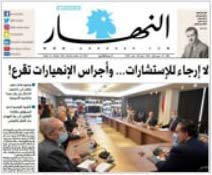The fastest way to rebuild Lebanon? Women should run 50% of the country
Ayah Bdeir
Let’s imagine we won the elections, and are tasked with rebuilding the country. We are now faced with a decision: do we build incrementally, follow the slow progress of nations everywhere, with the same trial and error and gradual adjustments? Or do we look around the world, pick the best lessons, the most current research, technology and advancements, and use them to leapfrog ahead and make up for lost time? I suspect you will say the latter.
With limited time and resources, what is the single highest return on investment activity we can focus on to achieve economic, social and humanitarian growth? We must aim for gender parity in government.
Yes, you read right: we should have women hold 50% of the positions of power.
I know you’re skeptical. I’m familiar with your skepticism: I’ve been operating in male-dominated circles all my academic life and career. I studied engineering at AUB, then at MIT, and worked in the tech ecosystem in the US and the Middle East for the past 15 years. So I know what I’m suggesting is a tall order, but stay with me.
To be clear: I don't believe we should make women 50% of leadership as a symbolic or charitable act. I am advocating it because decades of research and live case studies have shown that having women in leadership results in a snowball effect: our governments are more effective, our companies return more profits, and society as a whole functions better for everyone.
Some will say “with all our existential priorities, this is a distraction”. I would argue this is a highly effective way to achieve our priorities (not as the only solution of course, but in support of other solutions). In fact, it has been proven that every dollar invested in getting women into office has exponential return on every aspect of society.
Here’s why:
Our top priority in Lebanon is the economy → Research shows that when more women work, economies grow. Currently only 26% of women work in Lebanon (one of the lowest rates in the world) (source: World Bank). McKinsey Global Institute research shows that if women contributed their skills and productivity to the economy on the same basis as men, it would add over 2.7 trillion (or 60%) to the 2025 annual GDP in MENA. This would also reduce illiteracy, violence, maternal mortality, child marriage, all of which cost society money. (Source MGI).
Lebanon is deeply divided, in a region that is rife with war → Research from UNSCR and the CFR shows that including women in the peace processes raises the chance of a peace agreement lasting 15 years by 35%. Women are also more effective at building coalitions and reaching consensus. (Source: CFR).
We need every dollar to have a force multiplier in the Lebanese economy → Women reinvest 90 percent of their income into their families (compared to 30% for men), spreading wealth much further. They reinvest in the education, nutrition, and health of their children and help to break the cycle of poverty in their communities. A dollar invested in women can create a virtuous cycle: female spending supports the development of human capital, which fuels economic growth in the years ahead. (Source: IFC)
We need to empower the Lebanese private sector to build strong companies → A 2018 Boston Consulting Group study showed that for every dollar raised, companies with women cofounders generated 78 cents in revenue, whereas all male-run startups generated only 31 cents (source: BCG). Data collected by leading American venture capital firm found that the female-founder companies it had funded performed 63% better than the all-male founding teams it had funded. (Source: First Mark)
Lebanon is knee-deep in crises: energy, environment, health, brain drain → Women perform very well in a crisis. An analysis of 194 countries, published by the Centre for Economic Policy Research and the World Economic Forum, suggests countries led by women had “systematically and significantly better” Covid-19 outcomes (Germany’s Angela Merkel, New Zealand’s Jacinda Ardern, Denmark’s Mette Frederiksen, Taiwan’s Tsai Ing-wen and Finland’s Sanna Marin). (Source: Guardian, Forbes)
We need servant leaders, who put their country ahead of themselves → A large scale survey by EY of 1,000 13-17-year-olds shows that the top reason girls choose their dream job is “I think I can help others” (boys’ highest answer was “I think it would be fun” - 28%). (Source: EY)
The front line of the Lebanese crisis is a humanitarian and a human one → Women have been shown to lead with empathy, compassion and an ability to show support. (Source: HBR)
Lately, the Economist published an issue titled “Why nations that fail women fail”. It was a review of a global scientific study by Texas A&M that showed that the highest predictor of poverty and violent instability is the place of women in that nation. (Source: The Economist)
As a reality check, Lebanon was one of the first countries in the world to give women the right to get nominated and to vote (in 1943). But today Lebanon is #183 out of 187 countries in terms of women’s participation in parliament. And compared to the rest of the Arab world, we are at number 15 out of 17. (Source: FiftyFiftyLB)
We don’t need to do this incrementally: let’s leapfrog and save decades of iteration. We’ve seen success stories: in South Korea, in Sweden, in New Zealand, in the UAE. But more importantly, we’ve seen it work in Lebanon.
The Lebanon case
On October 22nd, 2019, some friends (majority women) and I cofounded DaleelThawra, the directory of the Lebanese revolution. Since then and over the past two years, we have worked with thousands of NGOs, grassroots humanitarian initiatives, activists groups, human rights lawyers, corruption reporters, diaspora cells, and have had the incredible opportunity to see people at the front lines of the Lebanese revolution and its rescue efforts. Women have had outsized presence in their impact.
They lead soup kitchens (like Paola Rbeiz who ran a volunteer soup kitchen serving 3 meals daily for 5 months to tens of thousands of people). They ran humanitarian NGOs (like Maya Abrahamshah of Beit el Baraka who supports over 250k individuals). They dispatched medicine (like Nour Najem from Lebanon Needs who provided medical assistance to over 2,500 patients and 45 hospitals). They saved natural resources from dams (like environmentalist Amani Beainy). They led huge investigations into the Beirut blast (like Lama Fakih and Aya Majzoub for Human Rights Watch). They organized peaceful protests (like the march of Christian and Muslim women in Ain al Remmaneh and Chiyah), orchestrated human chains, went into homes to fix windows and doors, and led teams of lawyers to get protestors out of detention. The list is endless, and this is just the past two years.
When there is a crisis, and they are not blocked from doing so, women rise up to the challenge. We must harness that talent pool and energy.
Not at the expense of men, in partnership with men.
I am not making the case for stripping (qualified) men of their rights or leadership potential. Nor am I saying we should compromise on qualifications for the sake of gender. (I also don’t consider the women in the last Lebanese caretaker government to be an example of this test; these were loyalist candidates and were executing on the ruling mafia strategy regardless of their gender.)
I am advocating for a partnership where society benefits from the incredible complementarity between men and women.
One such organization with absolute gender parity that has proven incredibly effective is Impact Lebanon. This London-based NGO raised over $9M during the Beirut blast and supported 18 NGOs; it has a founding team with a perfect partnership of equal numbers of men and women at the leadership and does an amazing job with their well-rounded efforts.
I am advocating that men and women be cofounders in a new Lebanon.
So what do we do?
This should not be an aspiration. This is a necessity. We need to leverage the brain power of half the population. We need 50% of the parliament to be women. It’s time for the head of parliament to be a woman; it’s time for the prime minister to be a woman. It’s time for women to be CEOs of our companies.
Independent political groups → Find these understated superstars
Ladies → Run for office
Electors → Vote for them
It is going to take some work to find the qualified women. Not because they don’t exist, but because decades of patriarchy have caused society to have biases towards women, and have caused women to have insecurities towards themselves.
Research shows that a woman who has the exact same qualifications as a man is less likely to apply for the same job (source: HBR). And research also shows that when names and genders are erased from resumes, women get hired at higher rates (source: HBR). So we must not be deterred by the fact that the superstar women are not as easy to find. But they are there.
It’s time we reap the explosive energy of these independent-minded, egalitarian, qualified public servants who will bring their whole selves and richness of experiences to the challenge ahead.
It’s time to have an equal partnership of men and women at the head of our country.
It’s time our leadership looks more like our homes and our society.
Ayah Bdeir is an entrepreneur, engineer and social activist. She is the inventor of littleBits, a US-based company that transformed STEAM education, the co-founder of DaleelThawra, and a steering committee member of NahwalWatan.
Bdeir graduated from AUB and the MIT Media Lab, she holds a dozen patents and her work is featured at the Museum of Modern Art and TED. Bdeir has won numerous awards including MIT Technology Review’s 35 Innovators, BBC 100 Most Influential Women and she has appeared on the cover of The New York Times Magazine and WIRED among others.



 اشترِك في نشرتنا الإخبارية
اشترِك في نشرتنا الإخبارية

























